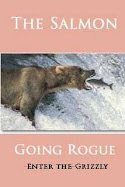I admire the work that Glen Beck is doing in educating his viewers about the philosophical basis of our Republic, it often seems like he is leading a Great Awakening in American political participation. There are times however when I cringe at Becks characterizations such as his recent attacks on early 20th century Progressives in general and President Teddy Roosevelt in particular.
To put the Progressive Era into historical context; it was a time of turbulent social and economic change in America. New immigrants were flooding into the county from eastern and southern Europe, immigrants who were ethnically and politically different than those that arrived in earlier generations. The Second Industrial Revolution, driven by scientific and technical advancements, combined with this new overabundant supply of unskilled labor transformed the relationship between workers and management. Added to this mix of ethnic and economic tension was a shift in the racial makeup of the northern industrial states as large numbers of blacks moved north in search of economic and political freedom.
Taken together you have a crucible in the United State and out of this crucible poured the problems of urbanization, poverty, and open and often deadly conflict between business and workers. Life under these conditions could be "nasty, brutish, and short" as incidents such as the Triangle Shirtwaist fire or the Ludlow (Colorado) Massacre illustrate.
Workers existed in an environment where they had little control and less protections. Whenever people are oppressed and their survival is threatened there is inevitably a response, Beck and the Tea Party movement today is just such a response. In the 1900’s these responses took the form of a myriad of ideologies whose purpose was to ameliorate the adverse effects of industrialization.
It may seem that I am splitting hairs here but progressives in the truest sense were mainly educated women of the middle and upper class’ that joined with the working class to improve conditions and expand liberties. While some identified themselves as having socialist leanings they believed in incremental change and didn’t necessarily believe that you had to upend the status quo to achieve it.
In Roosevelt’s defense he ran on the Progressive Party ticket more for political expedience than for a radical transformation of America. When Roosevelt was given a copy of Upton Sinclair’s “The Jungle” he wasn’t swayed into interfering in the relationship between capital and labor but he did think that the meat industry should make a product free of rats and feces. I doubt that even Beck would argue against the governments role in insuring a safe food supply.
The mistake that Beck makes in equating those Progressives with today’s so called Progressives is what historians call presentism. He is applying present day standards to historical narratives. In reality the Unions, the Socialist Party, and other radical groups that couldn't gain political traction didn’t just fade away they co-opted the name and morphed into the so called Progressives of today. Of course you can still find remnants of those groups but they have little influence outside of the Democratic Party.
Perhaps Beck can work to expose who these people really are and explain that the Progressives of today are not your Great Grandparents Progressives.
March 14, 2010
Subscribe to:
Post Comments (Atom)


_edited-1.jpg)




No comments:
Post a Comment